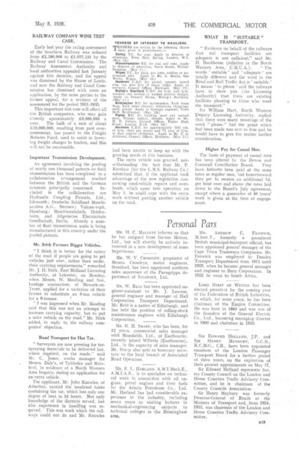RAILWAY COMPANY WINS TEST
Page 33

If you've noticed an error in this article please click here to report it so we can fix it.
Early last year the rating assessment of the Southern Railway was reduced from £2,180,000 to £1,077,131 by the Railway and Canal Commission. The Railway Assessment Authority and -local authorities appealed last January against this decision, and the appeal was dismissed by the House of Lords, and now the Railway and Canal Commission has dismissed with costs an application, by the same parties to the former appeal, for a revision of the assessment for the period 1931-1985.
This important test case will affect all the British companies, who may gain 6irectly aproximately £3,000,000 a year. The bulk of a sum of about £10,009,000, resulting from past overassessment, has passed to the Freight Rebates Fund, used to assist in lowering freight charges to traders, and this will not be recoverable.
Important Transmission Development.
Are agreement involving the pooling of nearly one thousand patents on fluid transmissions has been completed in a collaboration arrangement reached between the British and the German interests principally concerned, Included in the collaboration are Hydraulic Coupling Patents, Ltd., Isleworth ; Deutsche Schiffund Maschinenbeu A.G., Bremen ; Vulcan-vve.rk, Hamburg; Maschinenfabrik, Heidenheim, and Allgemeine Electricitats Gesellschaft, Berlin. Already a number of fluid transmission units is being manufactured in this country under the pooled patents.
Mr. Stirk Favours Bigger Vehicles.
" I think it is better for the safety of the road if people are going to get -vehicles just over, rather than under, their carrying requirements," remarked Mr. J. H. Stirk, East Midland Licensing Authority, at Leicester, on Monday, when Messrs. W. Mauling and Son, haulage contractors, of Newark-onTrent, applied for a variation of their licence to substitute i an 8-ton vehicle for a fl-tonner.
'1 was impressed when Mr. Masding said that this was not an attempt to increase carrying capacity, but to put a safer vehicle on the road," Mr. Stirk added, in reply to the railway companies' objection.
Road Transport for Hot Tar.
" Surveyors are now pressing for tarspraying materials to be delivered hot, where required, on the roads," said Mr. C. Jones, works manager for Messrs. Dale's, of Tyldesley and Rainford, in evidence at a North Western Area Inquiry, during an application for an extra vehicle.
The applicant, Mr. John Knowles, of Atherton, carried the insulated tanks containing the tar, which lost only one degree of heat in 24 hours. Not only knowledge of the districts served; but also experience in handling was required. This was work which the railways could not do and Mr. Knowles had been unable to keep up with the growing needs of this business. •
The extra vehicle was granted, notwithstanding the fact that Mr. P. Kershaw (for the L.M.S. Railway Co.) submitted that, if the applicant -LOA advantage of the new regulation concerning road-vehicle repairs and overhauls, which came into operation on May 1, he could cope with the extra work without putting another vehicle on the road.
WHAT IS " SUITABLE " TRANSPORT.
" Evidence on behalf Of the railways that rail transport facilities are adequate is not sufficient," said Mr.Backhouse (solicitor in the North WeStern Area, C.M.U.A.). "The words ' suitable' and adequate ' are totally different and the word in the Road and Rail Traffic Act is 'suitable.' It means ' to please ' and the railways have to show you (the Licensing Authority) that there are existing facilities pleasing to those who want the transport."
Sir William Hart, North Western Veputy Licensing Authority, replied that there were many meanings of the word " please," but the point which had been made was new to him and he would have to give the matter further consideration.
Higher Pay for Casual Men.
The basis of payment of casual men has been altered by the Devon and Cornwall Conciliation Board. They have hitherto been paid at the same rates as regular men, but henceforward they are to receive an additional Id. per hour over and above the rates laid down in the Board's July agreement, except where a guarantee of 48 hours' work is given at the time of engagement.




























































































